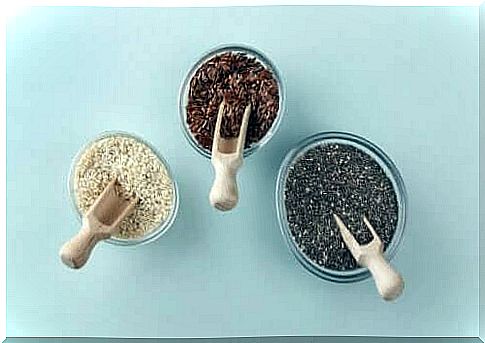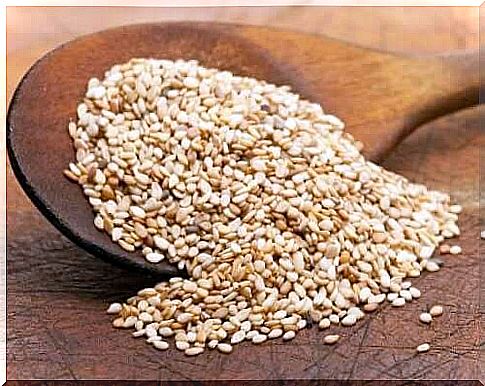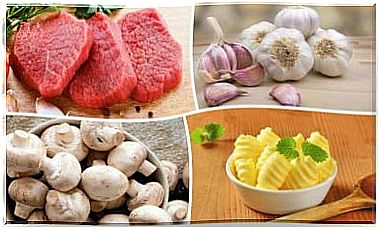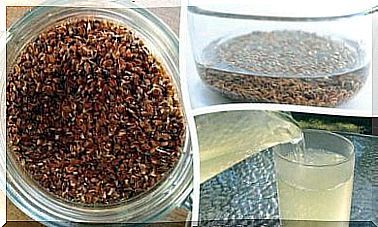Sesame Seeds And Their Nutritional Value

Sesame seeds ( Sesamum indicum ) come from a plant that grows in Africa and India. They began to spread around the world during the time of the slave trade, as slaves often preferred to travel with their own supplies in order to always have them with them.
These protein-rich seeds contain a significant amount of unsaturated fatty acids and important minerals such as iron, zinc and calcium.
In this article, we will tell you about the different types of sesame seeds and their nutritional value. Read on to find out more!
Sesame seeds and their types
Black sesame
These beans are often used because of the aroma they give off when baked. Although black sesame seeds have the same nutritional value as traditional sesame seeds, they are also rich in antioxidants.

They are used to make baked goods because, when roasted and ground, they give off an intense aroma and have a distinct flavor. This type of seed produces high-quality sesame oil.
Unhusked sesame seeds
Unhusked sesame seeds have a higher nutritional value than regular white sesame. They contain eight times more calcium than shelled seeds.
Products made from unshelled seeds, such as butter and tahini paste, tend to be darker and more bitter.
White sesame seeds
White sesame is used to make cakes, bread and other baked goods. They provide a crunchy texture.
About 50% of the weight of these seeds is oil. It is a staple seasoning in China and Japan that gives dishes a delicious flavor and aroma. These seeds also stimulate digestion and have many nutritional properties.
Sesame seeds and their nutritional value
Protein
While it’s true that they don’t contain all the essential amino acids, sesame seeds are high in protein. If you combine them with other grains, you will get a very valuable, healthy protein. It’s also a good idea to add some sesame seeds to your muesli flakes at breakfast.

Fats
These are essential fatty acids because our bodies cannot make them, which means we have to get them from our food. These acids are extremely beneficial to the cardiovascular system because they lower blood pressure and reduce the risk of conditions related to the health of the arteries.
Carbohydrates
Another notable property of sesame seeds is that they are high in fiber, a special type of carbohydrate. Fiber is essential for good gut health as it removes waste from the walls of this organ.
Vitamins
These seeds are rich in B vitamins (B1, B3, B6 and folic acid). They are essential for healthy skin and tissues and promote the proper functioning of the heart and muscles.
In addition, they contain a significant amount of vitamin E, one of the most antioxidant vitamins that is able to counteract the effects of free radicals.
Minerals
Sesame seeds contain various minerals such as phosphorus, potassium, magnesium, zinc, and the like. Most importantly, sesame is one of the richest sources of calcium.
Therefore, sesame is recommended for postmenopausal women and pregnant women.
The benefits of consuming sesame seeds
Eating sesame seeds regularly has many benefits:
- They protect your cardiovascular system. This is because the polyunsaturated fatty acids they contain improve the health of the arteries, thus reducing the risk of high blood pressure, heart attack and angina.

- Sesame seeds help people suffering from diabetes. According to studies, regular consumption of sesame oil lowers blood pressure and blood glucose levels in diabetic hypertension.
- Sesame can help fight depression. This is because the seeds contain a significant amount of the amino acid tryptophan, a precursor to serotonin that controls stress, anxiety, insomnia, depression and a lack of energy.
- The seeds reduce the risk of osteoporosis because they contain a significant amount of calcium.
- Sesame helps us stay healthy. The antioxidants, vitamins and minerals they contain keep the immune system in top shape and fight free radicals.
- They can protect the digestive system thanks to their fiber content. It protects the mucous membranes and reduces the risk of irritation (gastritis, heartburn, etc.).
- These seeds can improve oral health. According to Ayurveda (traditional Chinese medicine), keeping sesame oil in your mouth for a few minutes reduces the risk of cavities, gingivitis, plaque and bad breath.
Sesame seeds are a nutrient-rich product that you should add to your diet. Also remember to lead a healthy lifestyle and exercise regularly!









